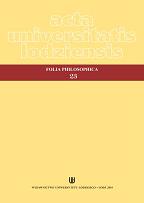Fiodor Dostojewski: o ułomności ludzkiego poznania
Fiodor Dostoyevsky on imperfection of human cognition
Author(s): Iwona Magdalena PerkowskaSubject(s): Philosophy
Published by: Wydawnictwo Uniwersytetu Łódzkiego
Keywords: Fiodor; Dostoyevsky; imperfection; human cognition;
Summary/Abstract: Fiodor Dostoyevsky in his oeuvre indicates certain attitudes, which are often recognized in the process of man’s thinking and behavior. They are conditioned by the manner he perceives reality and they in themselves appoint simultaneously this way of world perception. Some of those occurrences resemble in a great manner the defense mechanisms, which are described in the later literature. A first mechanism that was analyzed is pursue simplification, which causes a man to believe that thanks to the achieved knowledge he will be able to set in order and fix imperfect reality. Such attitude enforces simplified vision of the world, which in turn helps in self-deception. Dostoyevsky’s heroes have problems to recognize true motives of their own behaviors or they intentionally attribute nobler incentives to themselves. Therefore the next described attitude is reluctance to acknowledge the truth. The Russian writer rejects generally accepted disjunctivity of the ‘truth and false’ category and he attributes the final might to acknowledge something as true or false to the man’s will. On account of innate laziness and refractoriness, man chooses the simplest solutions, which in point of fact dismiss possibility to see real reasons for all failures. It makes impossible to undertake activities, which could indeed change something. Man is characterized by irresponsibility for his actions and words. A word looses its causative meaning and becomes purely a decoration, an ornament. All these make that learning the truth, as one of the elements propelling development of the philosophy, was not impossible but it was unwanted.
Journal: Acta Universitatis Lodziensis. Folia Philosophica. Ethica - Aesthetica - Practica
- Issue Year: 2010
- Issue No: 23
- Page Range: 119-129
- Page Count: 11
- Language: Polish

